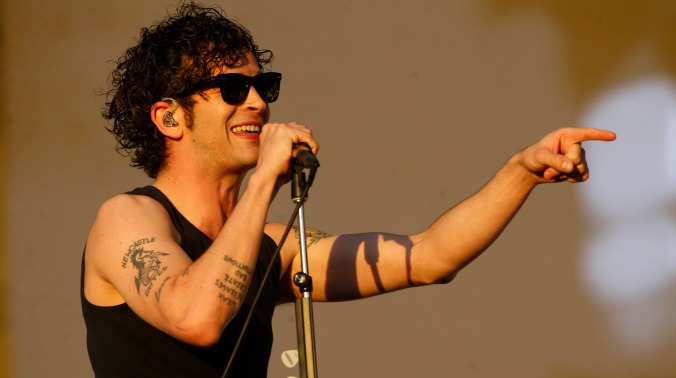Matty Healy says he was "briefly imprisoned" in Malaysia over same-sex kiss
The 1975 faced backlash in both hemispheres over a kiss between Matty Healy and Ross MacDonald

As The 1975 inch closer to their “indefinite” hiatus, frontman and international provocateur Matty Healy is taking time to tie up some loose ends from a chain of mostly non-music-related controversies he perpetuated over the course of the band’s previous tour. While Healy did apologize to Ice Spice for his racist comments about her on The Adam Friedland Show (or “that little podcast or whatever,” in the “Deli” singer’s awesome verbiage), he is refusing to back down concerning the fallout from his kiss with a male bandmate that rattled the Malaysian government.
For a refresher, The 1975 landed in hot water with multiple parties earlier this summer, after Healy kissed his bassist, Ross MacDonald, onstage during the band’s set at the Good Vibes Festival in Malaysia, a country where homosexuality is illegal. In response, the set and remaining two days of the festival were abruptly shut down, and the band was hit with a still-unresolved $2.7 million fine in losses from the festival’s organizers. While the kiss was an act of protest against the government’s stringent laws, many commenters still criticized Healy for perpetuating a “white savior complex” and disregarding the fact that any real blowback would land on queer people living in Malaysia rather than themselves.
Healy is having none of it. “To eliminate any routine part of the show (the kiss) in an effort to appease the Malaysian authorities’ bigoted views of LGBTQ people would be a passive endorsement of those politics,” Healy said in a lengthy speech at a recent show in Fort Worth, TX, during which he also revealed that the band was “briefly imprisoned” by the Malaysian government in response to the incident. “As liberals are so fond of saying, ‘Silence equals violence. Use your platform.’ So we did that. And that’s where things got complicated.…”
“The liberal outrage against our band for remaining consistent with our pro-LGBTQ stage show… was the most puzzling thing,” he continued, calling out his detractors for accusing him of both performativity and colonialism. “This bizarre mangling of colonial identity politics merely served as an expedient way to express their own disappointment with the festival’s cancellation,” he said. “I’ve got an inkling, that those who took to Twitter to voice their outrage over the 1975’s unwillingness to cater to Malaysian customs would find it abhorrent if the 1975 were to acquiesce to, let’s say, Mississippi’s perspective on abortion or trans rights.”
You can read Healy’s full speech (or watch a fan-recorded video) below (via Pitchfork):
This show has kind of bled off the stage into loads of different environments, and I don’t mind hollow, shallow accusations of being racist or stuff like that. It kind of allows this show to do what it’s designed to do, which is to expose intellectual inconsistencies and hypocrisies and use myself to do that.… [But] the 1975 did not waltz into Malaysia unannounced. They were invited to headline a festival by a government who had full knowledge of the band with its well publicized political views and its routine stage show. Malaysian festival organizers’ familiarity with the band was the basis of our invitation.
Me kissing Ross was not a stunt simply meant to provoke the government. It was an ongoing part of the 1975 stage show, which has been performed many times prior. Similarly we chose to not change our set that night to play pro-freedom of speech, pro-gay songs.
To eliminate any routine part of the show in an effort to appease the Malaysian authorities’ bigoted views of LGBTQ people would be a passive endorsement of those politics. As liberals are so fond of saying, “Silence equals violence. Use your platform.” So we did that. And that’s where things got complicated.…
Naturally, the Malaysian authorities were irate, because homosexuality is criminalized and punishable by death in their authoritarian theocracy. That is the violent reality obscured by the more friendly term of “cultural customs.”
 Keep scrolling for more great stories.
Keep scrolling for more great stories.
